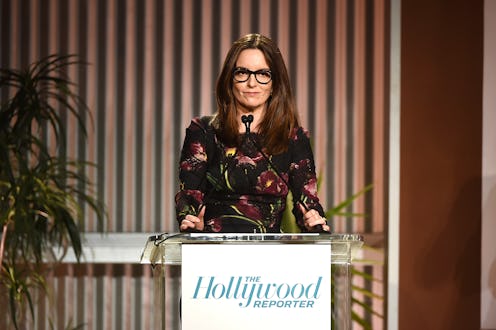News
Why Tina Fey’s Appeal To White Women Misses The Point

Money makes the world go 'round, especially when the president of the United States is trying to slash the federal budget. Donald Trump's attempts to both financially gut the national bureaucracy and institute questionable executive decisions have highlighted the need for individual donations, which one famous comedienne tried to address Saturday night. However, the fundraising drives aimed at average Americans feel a little disingenuous when the most able donors are already there in the room. Tina Fey's appeal to college-educated white women was ultimately aimed at the wrong demographic, and she'll have to look much closer to home to find the private fiscal support that the country really needs right now.
Performing at a Facebook Live telethon benefitting the ACLU, Fey told the white women responsible for electing Trump that they aren't allowed to bury their heads in the sand when it comes to the effects of his presidency. "This election was turned by ... white, college-educated women who would now maybe like to forget about [it] and go back to watching HGTV, and I would want to urge them... 'You can't look away,'" Fey said in a more serious moment of her performance. "Because it doesn't affect you this minute, but it's going to affect you eventually."
Fey is absolutely right in that the women responsible for helping elect Trump should be cognizant of the repercussions of their actions, but her admonition comes a little too close to shame to be effective. Women who supported Trump can't take back their votes now, even if they want to, and putting the blame squarely on their shoulders isn't representative of the electoral breakdown (men overall supported Trump over Clinton 53 percent to 41 percent). Trying to shame women into donating to a progressive cause is only going to make them want to turn away more, because even fully grown adults have a hard time accepting the consequences of their decisions.
Fey's strong point in the speech was her leadership by example, calling herself out as a college-educated white woman whose life probably won't be impacted too severely by the changes being proposed by the Trump administration. But the one social category that she conveniently forgot to mention was rich, and it's the one that she should have focused on. Fey really should have been addressing her celebrity peers, because realistically, they hold a lot of the cards right now.
While everyone counts equally in the ballot box, the nation is still about 18 months away from another chance to shake up the federal government — today, celebrities and their deep pockets are the ones who have the power to affect change by donating to organizations that will help take down Trump. Remember when people freaked out about the ALCU racking up nearly $25 million in donations following Trump's Muslim travel ban? Fey's own net worth is estimated somewhere between $45 and $65 million, and many of her celebrity colleagues, such as Jessica Alba, Julia Louis-Dreyfus, and Nicole Kidman are worth significantly more. Between a few of these ultra-wealthy stars, $25 million is pocket change, and asking for $10 at a time from (upper) middle class Americans feels like a misdirection of effort.
Granted, there's no way to tell exactly how much these celebrities are donating — I could very well be accusing any of these people of not putting their money where their mouths are when they actually do. Ironically, the only way to tell would be see their tax returns, which plenty of celebs cheered for when it was happening to Trump last month. It sure would be interesting to see the reaction if their own documents were going to be released to the public. In the increasingly open-sourced world that we live in today, it's hard to trust anything unless you see the receipts, so maybe celebrities should show how much they give before asking the everyday American to reach into his or her pocket.
Reaching out to the average person is still vital, because ultimately, America isn't a plutocracy. However, celebrities that run charity initiatives like this Facebook Live telethon can do more to prove that they really are leading by example. Whether the country is permanently moving to a public service model that relies entirely on private donations or this budget tightening is just a blip in history, it's time for celebrities to be a little more open about their own contributions to the progressive causes they plug.